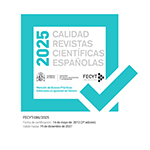Los periodistas y el derecho a la educación para todos
Abstract
After some blundering, the Spanish press became, from the 1780’s, one of the main means of diffusion for Enlightenment, that could not remain the prerogative of the Elite only. Many journalists indeed presented the newspapers as an extraordinary means for diffusing knowledge and progress, essential for all of those who wanted to contribute to a broad diffusion of this Enlightenment. In the name of the universal right to education, some publicists, dreaming of gaining new markets, decided to speak to those who usually had no access to knowledge (rural workers, craftsmen, women…). This paper presents and analyses the projects of these Don Quixote of the philosophical world, most of which were not carried out, but that show the evolution of society, and participated to the difficult construction of a new Spain that some (as Moratin) wanted to be more equalitarian.Downloads
Article download
License
In order to support the global exchange of knowledge, the journal Cuadernos de Historia Moderna is allowing unrestricted access to its content as from its publication in this electronic edition, and as such it is an open-access journal. The originals published in this journal are the property of the Complutense University of Madrid and any reproduction thereof in full or in part must cite the source. All content is distributed under a Creative Commons Attribution 4.0 use and distribution licence (CC BY 4.0). This circumstance must be expressly stated in these terms where necessary. You can view the summary and the complete legal text of the licence.












